Electronic toll collection on highways: NHAI signs pact
September 20, 2014
NHAI-promoted Indian Highways Management Company Limited (IHMCL) has inked a pact with Axis BankBSE 0.57 % for services related electronic toll collection, which the government plans to introduce pan-India.
Considering the complexities and geographical spread, the nationwide electronic toll collection (ETC) would be first of its kind in the whole world.
“IHMCL, a NHAI promoted company and Axis Bank has signed an agreement for provision of Central Clearing House (CCH) services and sale of FASTag, for Electronic Toll Collection (ETC) at the Toll Plazas on the National Highways,” an official statement said today.
It said ETC system on Delhi – Mumbai stretch of the national highways will be made operational by the end of this month and a nationwide rollout will be carried out by the end of year.
Earlier this year, IHMCL had signed agreement with ICICI Bank also and it has two banks now to perform clearing and settlement of electronic toll transaction, which is a key requirement for electronic toll collection.
This is subsequent to the initiative taken by the Ministry of Road Transport & Highways, NHAI and IHMCL for implementation of unified Electronic Toll Collection on Indian national highways.
Electronic Toll Collection enables road users to pay highway tolls electronically without stopping at the toll plazas.
“The unique number of the RFID FASTag affixed on the wind shield of the vehicle will be read by the readers fitted in the dedicated ‘ETC’ lanes of plazas and the toll will be deducted automatically,” the statement said adding this will help in reducing congestion at the toll plazas and enable seamless movement of vehicles on the national highways.
The Ministry has decided to roll out ETC programme in the country under the brand name “FASTag”.
The dedicated ETC lanes will have colour coding for distinct identity recognised as “FASTag lanes”.
ICICI Bank and Axis bank, engaged for providing CCH services, would distribute RFID based “FASTag” through their franchises/agents and at points of sales near the toll plazas
Road users can enrol and get “FASTag” affixed on their vehicles at designated toll plaza locations or Point of Sale (POS) stations of Axis bank and ICICI bank.
Such type of highway tag brands are common in developed countries and are known by different names like “Eazee Pass”, “SunPass” in the US, “e-Pass” in Australia, “Salik” in Dubai etc
Press Information -MHI’s RFID based ETC System Begins Commercial Operation in India, Helping to Ease Traffic Congestion and Preserve the Environment
December 5, 2013
Tokyo,
The electronic toll collection (ETC) system operating by radio frequency identification (RFID) equipment supplied by Mitsubishi Heavy Industries, Ltd. (MHI) began commercial operation on an expressway in India’s Gujarat state. The system, involving RFID readers installed at toll plazas to detect in-vehicle adhesive RFID tags and collect tolls, will contribute to easing of traffic congestion and to preservation of the country’s environment. The event marks the first supply of an RFID based ETC system to India from Japan.
MHI provided the major equipment comprising the RFID based ETC system including 30 sets of RFID readers. The equipment was ordered by KENT Intelligent Transportation Systems (India) Private Limited, an Indian toll collection system integrator. The ETC equipment provided by MHI complies with Indian national standards and communicates with the RFID tag which is distributed for the ETC operation under regulations in India. MHI delivered RFID equipment newly designed dedicated for ETC operation.
The newly inaugurated RFID based ETC system is in operation on a 95-kilometer (km) highway connecting Ahmedabad, the largest city in Gujarat, and Vadodara, the state’s third-largest city, operated by IRB Infrastructure Developers Ltd, a leading road concessioner in India. It marks the country’s first fully access-controlled expressway. It encompasses a total of 59 lanes at 6 tollgates, of which 28 lanes are equipped with the new RFID based ETC system.
While motorization has been making rapid progress in India in tandem with the country’s steady economic growth, road infrastructure is needed to keep pace with this development. To rectify the situation, Indian governments and road concessionaires are now focusing on improving the nation’s road network, and installation of the RFID based ETC system is part of that broad initiative.
MHI is a supplier of comprehensive ETC system and Intelligent Transport System (ITS). The company has an abundant track record of deliveries both at home in Japan and overseas. Gaining momentum from its introduction in India, going forward MHI aims to further strengthen its marketing activities for various ETC systems suited to the needs and conditions of each country.

Toll gate at main road in Ahmedabad

RFID tag
Source-http://www.mhi.co.jp
Now road toll can be paid without stopping at plazas
April 20, 2012
Union Minister for Road Transport and Highways C.P. Joshi on Thursday unveiled India’s first Radio Frequency Identification (RFID) technology-based Electronic Toll Collection (ETC) Plaza at Chandimandir here. He also inaugurated the four-lane Zirakpur-Parwanoo section of National Highway 5 passing through Punjab, Haryana and Himachal Pradesh.
Calling for coordinated efforts by the Central and State governments for making India a developed nation, Dr. Joshi said: “A qualitative infrastructure development is the need of the hour.”
Stating that a thrust to infrastructure development had been given in the 11th and coming 12th Five-Year Plans to increase the national Gross Domestic Product, he said the endeavour was to facilitate the common man with new technology and better road transportation facilities.
Dr. Joshi said all the highways in the country would be enabled with RFID technique that “helps users to pay the toll tax without stopping at toll plazas and reduces traffic congestion and commuting time.”
“Toll statements can also be made available online to the road users and they need not stop for the receipt,” he added.
He said his Ministry would consider giving exemptions and concessions to a certain category of users as per the request of Haryana Chief Minister Bhupinder Singh Hooda and his Punjab counterpart, Parkash Singh Badal, besides that of Union Culture Minister Kumari Selja and Haryana PWD Minister Randeep Singh Surjewala.
Dr. Joshi, however, asserted that the need of the hour was to rise above populism as the companies which had created huge infrastructure had to recover their costs through toll collection.
Referring to the “bottlenecks” faced by residents of Panchkula, he said these would be technically examined.
He disclosed that the National Highways Authority of India (NHAI) has completed projects worth Rs. 1,913 crore in Haryana, Rs. 1,419 crore in Punjab and Rs. 50 crore in Himachal Pradesh. He added that the NHAI would take up major road projects measuring 1,167 km in Haryana, Punjab and Himachal Pradesh during the current financial year.
Mr. Hooda said this project would benefit the people of Haryana, Punjab and Himachal Pradeshas they would not have to face traffic jams on the highway. He urged the Union Minister to formally approve various roads in Haryana as National Highways which had been approved in-principle.
Local MP Kumari Selja demanded the conversion of the Saha-Ambala stretch into a national highway.
Mr. Badal stated that the payment of toll, though unpalatable to the public, had become a necessity and there was no way out.
RFID tags
Meanwhile, ICICI Bank officials said the bank was working with the toll operators for issuing RFID tags to road users to be read at the toll plazas. Users, who need to register themselves, could use the tags across multiple toll plazas; they could be updated and would act as a record for settlement of financial transactions of the toll operators.
Radio Frequency Identification
November 30, 2011
The Government has a proposal to introduce Radio Frequency Identification (RFID) Smart Tag on certain highways in the country National Highways Authority of India (NHAI) has adopted Public Private Partnership (PPP) mode as the preferred mode of delivery. Two variants of PPP model i.e. Build, Operate and Transfer (BOT) (Toll) and BOT (Annuity) have been adopted. So far 149 projects of length 13791.25 km have been awarded on BOT (Toll) and 29 projects of total length 3311.42 km have been awarded on BOT (Annuity).
It is proposed to extend the scheme to other parts of the country also. The Electronic Toll Collection scheme shall be implemented on all India basis.
It is also proposed to build toll roads on Public Private Partnership (PPP) model in various parts of the country. The specification for Radio Frequency Identification (RFID) transceivers, RFID Tag & Data Exchange format between Toll Plaza server and the Central Electronic Toll Collection (ETC) System for implementation of national wide interoperable ETC system based on RFID technology on National Highways has been finalized. RFID will be based on EPC Gen-2, ISO 18000-6C standards for Electronic Toll Collection on National Highways in India.
This information was given by the Minister of State of Road Transport and Highways, Shri Jitin Prasada in a written reply in Lok Sabha today
Source: http://pib.nic.in
Kapsch TrafficCom consortium successfully launches ETC system in Poland Traffic Technology
July 7, 2011
The Polish Directorate for National Roads and Highways (GDDKiA) has said that the Kapsch TrafficCom consortium has successfully launched the country’s ‘viaToll’ electronic toll collection (ETC) system this week. The Kapsch consortium has implemented a comprehensive and state-of-the-art ETC system on the existing road network of approximately 1,560km (970 miles), which applies to all vehicles weighing over 3.5 tons. The consortium will also provide commercial operation of the system for the next eight years through its Polish operation’s company and will continue to extend the existing system to additional roads during the operational period. The Polish Finance Ministry expects that the system will increase the country’s revenues by about US$145 million (PLN400 million) by the end of this year.
“The entire system is now operational,” enthused Michael Gschnitzer, Kapsch TrafficCom’s sales director. “Until today we had successfully registered more than 300,000 vehicles – in the upcoming days we expect to distribute around 25,000 onboard units daily. As a result of the big interest of the road users, we extended the capacity and working hours on most of the points of sale. The mobile enforcement units already successfully control whether vehicles above 3.5 tons are properly equipped with OBUs. The system was implemented in record time. For the whole implementation, we had not more than eight months. There is still enough to do for us, but the system could now successfully go into operation.”
Workshop on Nationwide Electronic Toll Collection, held at Vigyan Bhawan, New Delhi on June 14, 2011
June 15, 2011
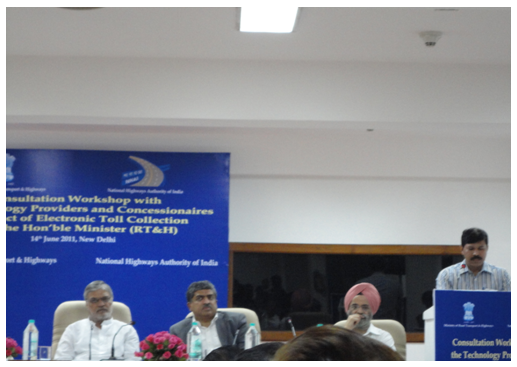
Workshop on Nationwide Electronic Toll Collection
- Mr. C P Joshi , Honrable Minister Road Transport and Highways
- Mr. Nandan Nilkani , Chairman , UIDAI
- Mr. R S GUJRAL , Chairman NHAI
- Mr. Ravi Palekar , GM (Electronics) , NHAI – Addressing the gathering
- Mr. Sachin Bhatia, CEO, Metro Infrasys
Workshop on Nationwide Electronic Toll Collection held at Vigyan Bhawan, New Delhi. With an objective of paving way for a unified Electronic Toll Collection (ETC) technology for National Highways in India, the Ministry of Road Transport & Highways constituted a Committee under the chairmanship of Shri Nandan Nilekani Chairman of UIDAI with a mandate to examine all technologies available for Electronic Toll Collection (ETC) and recommend the most suitable one for implementation throughout India. The other members of the Committee are Prof. Pankaj Jalote, Director, IIIT-Delhi ; Dr. Kolin Paul, Asst. Professor, IIT-Delhi ; Shri A.V. Sinha, DG (Road Development) & Special Secretary, MoRT&H and Shri. V.L. Patankar, Member (Technical), NHAI (Member Secretary).
The Union Minister for Road Transport & Highways Dr. C.P. Joshi has said that we should chalk out a plan to increase the percentage of national highways from present 2.2 % to 5 % in the next 10 years. Delivering inaugural address at the Consultation Workshop with the Technology Providers and Concessionaires in respect of Electronic Toll Collection (ETC) here today, he said that keeping in view the various types of highways there should be a hybrid pattern of toll collection. The Workshop was jointly organized by Ministry of Road Transport & Highways, National Highways Authority of India & National Informatics Centre. The Chairman of UIDAI Shri Nandan Nilkeni & Minister of State for RT&H Shri Tusharbhai A. Chaudhary also addressed the workshop. Shri R.S. Gujral, Secretary Ministry of Road Transport & Highways and Dr. V.K. Gairola, D.G (NIC) were present.
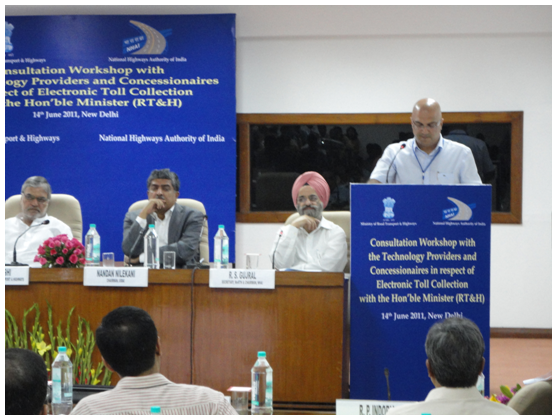
Mr. Sachin Bhatia CEO Metro Infrasys expressing the support from Industry Fraternity
Based on the recommendations of the committee headed by Mr. Nandan Nilekani to use RFID technology for ETC, the Apex Committee, responsible for ETC implementation planning, is in the process of prescribing certain standards which should be complied with all over the country to ensure interoperability. The primary purpose of this workshop was to take feedback from the key stakeholders, comprising concessionaires and ETC technology service providers. Security, cost effectiveness, convenience and scalability have been the main criteria based on which the detailing has been done.
Based on the feedback, the specifications and data detailing will be finalized for open market release. The plan is that the authorized manufacturers will be producing Transceivers and Tags based on these standards, the concessionaires will be procuring these Transceivers and in turn, the technology service providers will be integrating the entire ETC system at the toll plaza. Although details on other aspects like clearing house are being worked out simultaneously, majority of the decisions will depend upon these standards only.
Followings are the Tolling Companies, RFID Manufacturer and concessionaire took part in the workshop:
- Kapsch Metro
- Egis Infra
- L&T Infra
- GMR
- HCC Infrastructure
- JICA
- IRDSA
- DSC
- EFKON India
- Siemens
- IAITO Infotech Pvt. Ltd.
- ESSEN, Mumbai
- ATT System, Banglore
- Mitsubishi
- IBI Group
- Neology
- Steria
- Tag Factory
Brief of discussion over finalization of technology between committee and Industry Peoples:
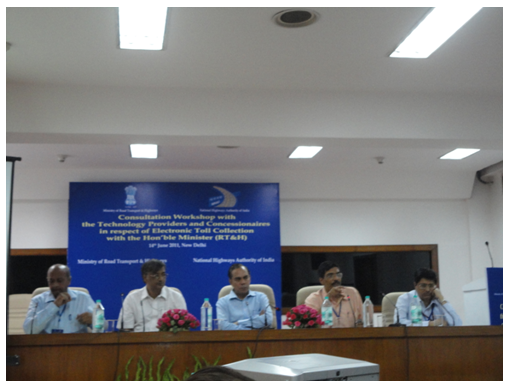
- Dr. B.K. Gairola, Director General, NIC – extreme left
- Dr. Y.K. Sharma, DDG, NIC - middle position
- Dr. Rajat Moona, Director General of CDAC, IIT Kanpur
- Dr. Y.K. Sharma, DDG, NIC - extreme Right
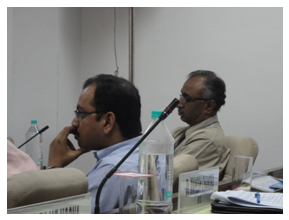 Mr. Venkat from GMR expressed change from IP 66 to IP 65 for the readers as IP 65 is also good enough and IP 66 will increase the cost for the readers without any additional value.
Mr. Venkat from GMR expressed change from IP 66 to IP 65 for the readers as IP 65 is also good enough and IP 66 will increase the cost for the readers without any additional value.
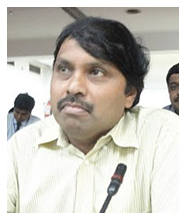 Mr. Hari from Efkon
Mr. Hari from Efkon
He raised an issue over the relative humidity of 100% for Transceiver antenna.
Committee Conclusion :
Committee agreed for the IP 65 standard and 95% relative humidity as it comply against all possible environmental threat at toll scenario.
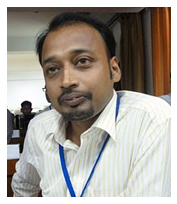 Mr. Anand Shenoy from IAITO Infotech Pvt. Ltd.
Mr. Anand Shenoy from IAITO Infotech Pvt. Ltd.
Raised his voice over minimum requirement of reading of 10 Tags per second with 240 bits of EPC memory and 64 bits of Tag Id.
Committee Conclusion: committee agreed onto change it to 2 Tags per second with above said minimum requirement. On the other query raised by Mr. Shenoy that the data retention period must be 3-4 year for the tag memory instead of 10 years as their is no UV protection asked for the tag and without any special material with the effect of UV rays its hard to maintain the data in tag for 10 years, The committee replied as they will keep it under consideration and if required they will bring it in next phase.
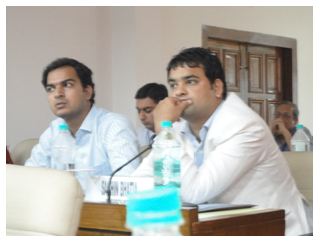 On the query raised by Team from Metro Infrasys- Mr. Nitin Thakur and Mr. Harimohan for the option of having color coded Tags for different class of vehicles, as it will help in operation at toll plazas. The Committee said that it is difficult to see the color in the moving car in the sun. However committee will discuss it in next phase.
On the query raised by Team from Metro Infrasys- Mr. Nitin Thakur and Mr. Harimohan for the option of having color coded Tags for different class of vehicles, as it will help in operation at toll plazas. The Committee said that it is difficult to see the color in the moving car in the sun. However committee will discuss it in next phase.
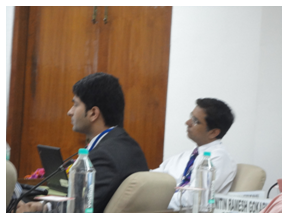 Mr. Vipul Sharma(Left), Mr. Mayank Manish(Right)
Mr. Vipul Sharma(Left), Mr. Mayank Manish(Right)
The long discussed topic was the polarization standard for the antenna, Panel has asked for circular polarization pattern for the antenna but Mr. Vipul Sharma and Mayank Manish from one of the leading manufacturer of RFID Equipment Neology reasoned to have it linearly polarized due to its long range and less interference phenomenon, also linearly polarized antennas can work at higher speed , committee keep this for discussion and will revert again.
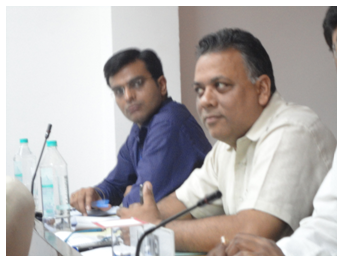 Mr. Manoj Agarwal and Mr. Manish from Delhi Gurgaon Expressway strongly supported the idea of a law for putting a penalty on cash vehicles coming to Tag lane .
Mr. Manoj Agarwal and Mr. Manish from Delhi Gurgaon Expressway strongly supported the idea of a law for putting a penalty on cash vehicles coming to Tag lane .
For the standard for the communication between plaza server and CCH server, there will be addition of Plaza id into the prescribed format by the committee. Plaza level fare plan and policy will be governed by the plaza itself while the global discount will be governed by the CCH server and will be updated in all the plaza server by CCH server itself. Committee also agreed to look into the various aspects of fare plans at different plazas.
Highlights of the Workshop:
ETC critical components:
Tag Distribution Channel & Inventory Management
- On-line channels by user
- Authorized service centers of vehicles (Service centre need to install the SPV client software and antenna connection), since centre must have authorized people to affix tags.
- RTO(Operation is similar to above)
- Vehicle dealer network(Operation is similar to above)
- Authorized point of sale installation(POS can be insurance companies, PUC centers, Petrol Pumps etc; Operation is similar to above)
Inventory Management of Tags:
SPV will keep track of allocated EPC Ids, Tag Ids etc. It will perform a demand forecast Tags and keep the tags available for distribution through distribution channel.
Handling Special Cases
- Valid ETC enabled vehicle was ejected due to non-read of Tag – Premium cash lane should verify it with the ETC database.
- Clone Tag – If customer complains/suspects that his/her Tag is cloned, Tag re-initiation is to be done for same Tag. Old Tag value is marked for special handling.
- Change in registration number of vehicle – Vehicle should approach distribution channel network and get a new tag. Old tag is to be destroyed physically and listed for special handling.
- De-registration of vehicle (due to destruction/ end of life/ Export etc.)-Tag is to be destroyed physically and listed for special handling.
Listing for Special Attention
Vehicle is listed for special attention following conditions:
- Insufficient balance as determined by clearing house
- Credit card co. declined the payment
- On Police look-out
- Suspected cloned Tag
- Tag with invalid Vehicle Registration no. (e.g. when Registration no. is changed)
- When toll plaza operator notices Tag carrying details different from vehicle itself (e.g. the vehicle Registration no. and/ or Vehicle class)
Videos
Conclusions drawn at the end of the seminar:
Documents Attached:
- Agenda Workshop
- Apex Committee for ETC Implementations – GOI, Draft Specifications Document
- ETC Report on RFID – July 2010
 This story is covered by Mr. Sachin Bhatia.
This story is covered by Mr. Sachin Bhatia.
Kapsch TrafficCom acquires Mark IV IVHS
November 9, 2010
Kapsch TrafficCom acquires Mark IV IVHS, the largest supplier of electronic toll collection (ETC) equipment in North America.
Vienna, November 5, 2010. Kapsch TrafficCom AG (ISIN AT000KAPSCH9), listed on the Vienna Stock Exchange in the prime market segment, has agreed to acquire through subsidiaries the businesses of MARK IV IVHS, part of MARK IV, LLC (U.S.), in the United States, in Canada and in Mexico for a purchase price of USD 70 million (approximately EUR 50 million), subject to certain closing conditions and subject to certain potential price adjustments based on working capital included with the business. The transaction is structured as a stock purchase of the holding companies which own the Mark IV IVHS business, and closing is targeted for 30 November 2010.
 MARK IV IVHS is a designer and manufacturer of dedicated short-range communication (DSRC) devices that are widely used by highway, toll, turnpike, tunnel, and bridge authorities to enable intelligent transportation systems (ITS) such as electronic toll collection (ETC) and automated weigh station bypass. With more than 21.8 million transponders on-the-road and more than 3,700 lanes equipped, MARK IV
MARK IV IVHS is a designer and manufacturer of dedicated short-range communication (DSRC) devices that are widely used by highway, toll, turnpike, tunnel, and bridge authorities to enable intelligent transportation systems (ITS) such as electronic toll collection (ETC) and automated weigh station bypass. With more than 21.8 million transponders on-the-road and more than 3,700 lanes equipped, MARK IV
IVHS is the largest supplier of ETC equipment in North America. MARK IV IVHS has enabled many landmark ITS deployments, including: the world’s first non-stop, all-electronic toll road (Highway 407 ETR, Canada); interoperability between truck electronic preclearance systems and toll collection (PrePass); and, the E-ZPass® system of the 24 toll authorities in 14 states who comprise the E-ZPass® Group in the Northeastern United States. E-ZPass® is a regional ETC system that can be used throughout the Northeast and Midwest regions of the United States. MARK IV IVHS also recently announced a contract award in exico. With 142 employees, MARK IV IVHS generated in its last fiscal year 2009/2010, ended February 28, 2010, net sales of approximately USD 50 million (approximately EUR 36 million) at a clear positive free cash flow and at an EBITDA margin accretive to the EBITDA margin of Kapsch TrafficCom Group generated in its last fiscal year 2009/2010, ended March 31, 2010.
Kapsch TrafficCom is an international supplier of superior intelligent transportation systems (ITS). Its principle business is the development and supply of electronic toll collection (ETC) systems, in particular for the multi-lane free-flow (MLFF) of the traffic, and the technical and commercial operation of such systems. Kapsch TrafficCom also supplies traffic management systems, with a focus on road safety and traffic control, and electronic access systems and parking management. With approximately 240 references in 39 countries on all five continents, and with more than 19 million transponders (on-board units – OBUs) delivered and nearly 13,000 lanes equipped, Kapsch TrafficCom has positioned itself among the leading uppliers of ETC systems worldwide. Kapsch TrafficCom is headquartered in Vienna, Austria, and has ubsidiaries and representative offices in 25 countries. With currently almost 1,500 employees, Kapsch TrafficCom Group generated revenues of EUR 216 million (approximately USD 300 million) in its last fiscal year 2009/2010, ended March 31, 2010.
For more information, please contact:
Marcus Handl
Investor Relations
Kapsch TrafficCom AG
Phone: +43 (0) 50 811 1120
Am Europlatz 2, A-1120 Vienna, Austria
E-mail: [email protected]
www.kapschtraffic.com
www.kpasch.net
Road Ministry adopts new technology standard for electronic toll collection
July 29, 2010

RFID technology: The Chairman, Expert Committee on Electronic Toll Collection Technology, Mr Nandan Nilekani, submitting the report to the Minister for Road Transport and Highways, Mr Kamal Nath, in the Capital on Friday.
Toll booths on National Highways will adopt the passive RFID technology standard – ISO 18000 6C — for electronic toll collection (ETC) system, based on the recommendation of a committee set up for this purpose, headed by Mr Nandan Nilekani, Chairman, Unique Identification Authority of India (UIDAI). The recommendations have been adopted by the Highways Ministry.
In the ETC system, vehicles will have tags on their windscreens – where amounts can be pre-loaded (just like prepaid SIM cards for phones) – and when the vehicles pass through NH toll lanes with tag readers, the toll amount would automatically get debited. This will pave the way for setting up of ETC system across the NH network.
EARLIER ATTEMPTS
Since last four years or so, attempts of National Highways Authority of India (NHAI) to adopt any technology standard for this project had been thwarted by companies which had competing technology of ETC. This standard was chosen because of many factors. For instance, for vehicle owners, the cost of adopting this technology will be much lower compared to other standards; it has been used in many countries in the last one decade. Also, there are multiple vendors such as Neology, Intermac, Motorola, Sirit, Alien and Invango, who operate in this space.
For the system to work, the user vehicles need to buy tags and have them attached to the windscreen; the toll booths require a tag reader; and a central toll clearing house has to be set up which will take care of all reconciliations between various road developers. For instance, between two points of travel, a commercial vehicle might cross five tolling booths – two of which are operated by the NHAI and three by three different private concessionaires. The clearing house operator will ensure that the amount debited from the vehicles’ on board unit (tag) at each of these toll plazas is credited into the concerned owner/operator of the highway stretch on a real time basis. As more vehicles adopt the ETC, the toll revenue leakage can be contained to a large extent.
COST
“There are about 147 toll booths on the NH network, out of which about 100-odd are operated by NHAI and remaining by private developers,” Mr V.L. Patankar, Member-Technical, NHAI, said. Each reader will cost about Rs 2 lakh. Each NH toll booth will have at least two lanes (one on each side) with tag readers. NHAI or the operating concessionaire is likely to bear the cost of setting up tag readers at its toll plazas though the Union Highway Minister, Mr Kamal Nath, said he expects the system to be “self-financing”. It is also not clear as to who will fund the clearing house operator. At present, two NH stretches have ETC options –Delhi-Gurgaon Expressway and Bangalore-Electronic City elevated highway.
THE WAY FORWARD
The committee has recommended that a system integrator for ETC design and implementation be there, and hiring of a consultant for the financial bidding and vendor selection. An authority has to be set up to operate central system. Also, the committee has said that a high penalty system should be worked out to handle violators – vehicles who try to pass through the plaza without enough funds.
The National Institute for Smart Government – an eGovernance Innovation Library in IIT Delhi – is likely to help the Road Transport Ministry in the initiative.
TIMELINE/OTHER APPLICATIONS
Mr Nath said the process of setting up the ETC systems should be initiated in 18 months. He added that he will talk to SIAM to ensure that vehicles are sold with pre-fitted tags. Mr Nilekani added that with ETC in place, the card can by used by various other operators such as parking owners, state highway concessionaires, etc., for payments. Mr Nilekani also said that a public portal should provide data on vehicle traffic on highways and toll plazas.
Source:
[email protected]
thehindu.co.in
New ISO specification for ETC systems
January 27, 2010
A newly published ISO Technical Specification harmonises the requirements for electronic fee collection (EFC) systems on roads subject to toll charges. It will facilitate mobility between different road networks and help to ensure reliable data collection and correct charging.
ISO/TS 12813:2009, “Electronic fee collection – Compliance check communication for autonomous systems”, will help to ensure the optimal use of on-board equipment (OBE) interfacing with satellite positioning to collect the data required for charging for the use of roads in an autonomous mode, without relying on dedicated road-side infrastructure.
The standard defines the requirements for using dedicated short range communication (DSRC) between on-board equipment and an interrogator for the purpose of checking compliance of road use with a local toll regime. This will enable checking of non-national vehicles and thus enable cross border enforcement of non-compliant vehicles.
The scope of the Electronic Fee Collection (EFC) standards relates to EFC charging systems and information exchanges over the interfaces. The standards focus on the interface between the on-board and the roadside equipment, but also deal with the ‘Information data flows between operators’. The standards primarily cover EFC systems based on Dedicated Short-Range Communication (DSRC); Cellular Network / Global Navigation Satellite Systems (CN/GNSS), and Integrated Circuit Card (ICC) technologies.
The standards suite includes not only ‘requirements’ but also associated test procedures, in order to support conformity evaluation of EFC on-board and roadside equipment. It also includes security guidelines that can be useful in the preparation or evaluation of security requirements.
ISO/TS 12813:2009, Electronic fee collection – Compliance check communication for autonomous systems, was jointly developed by ISO technical committee ISO/TC 204, Intelligent Transport systems and CEN/TC 278, Road transport and traffic telematics.
ATTSII Recommends Guidelines For A Suitable Electronic Toll Collection Standardisation For India
July 31, 2008
PROPOSES WORLD WIDE TESTED AND RECOGNIZED CEN 278, BASED ON DSRC MICROWAVE TECHNLOGY
New Delhi, 23rd July, 2008: The Association of Toll and Traffic Systems Integrators of India (ATTSII) has recommended guidelines for a suitable Electronic Toll Collection (ETC) to the working group formed by the Committee of Road Safety and Traffic Management, Ministry of Surface Transport and Highways to determine the technology for Advance Traffic Management Systems, Advance Travel or Information Systems and Electronic Toll collection Systems. The association proposes CEN 278 standard based on DSRC (Dedicated Short Range Communication) microwave technology for the Indian subcontinent keeping in mind the Indian environment and driving conditions.
Representing the association, Mr. Sachin Bhatia, President ATTSII and Country Director of KAPSCH METRO JV said, “CEN 278 is the most acceptable technology worldwide with interoperability standards. It is already successfully implemented at the Delhi – Gurgaon Expressway, the largest 32 lane toll plaza in India. Introduction of smart tags based on microwave technology has received overwhelming response from drivers who earlier had to wait in long queues for several hours at the Toll. Now, it only takes few seconds for each vehicle to pass through, significantly reducing waiting time. CEN 278 is a cost effective technology as multiple vendors are present in the market to ensure that customers get the best competitive deal.
“At a time when India is starting to put in place the ETC technology, it should adopt the most advanced technology that is pre tested, allows wider applications and faster data transfer speed. We cannot afford to lose time in deciding on a technology as there is an urgent need to meet the ever increasing traffic management requirements in India that suits the masses and is most viable to implement,” said Mr. Aman Kishore ,VP of the ATTSII and Managing Director of International Road Dynamics (IRD) South Asia.
“IRD have successfully implemented CEN 278 standard microwave based Electronic Toll Collection(ETC) technology in April 2006 at Hoogly River Bridge Commissioners (HRBC) site at Vidyasagar Setu – Kolkata. HRBC is a West Bengal Government organization for operation, implementation and maintenance of Hoogly Bridge. Currently, it has 24 lanes at 1 Plaza with 4 ETC Lanes and is efficiently meeting requirements of the department to cater to heavy traffic volumes in a matter of seconds at the entry to Kolkata city,” added Mr. Kishore.
He further explained, “Most of the Build Operate Transfer (BOT) operators are opting for technology for ETC which is more cost effective and operationally efficient for Indian conditions. Recently, we have bagged an order for implementation of CEN 278 standard microwave based ETC from one of biggest BOT and O&M operators in the country – Ideal Road Builders (IRB), Mumbai for one of its locations at Mumbai’s Entry Points. The decision of opting for Microwave based ETC technology by such a reputed company must have been taken after much due diligence.”
“The major advantage of the microwave technology is the presence of numerous vendors in the market that generates fair competition. We must understand the emerging traffic volume in our country and we must opt and guide for technology which best meets diverse user needs and national interest, rather than being guided by commercial interest of vendors.
“CEN 278 standard is based on microwave technology, making it more reliable, robust and viable. A very recent example is the stormy morning of 14th May; any other known standards based on other technologies like infrared would have created chaos at points where it would have been applied. This is because in dusty weather, data fails to be securely transmitted, resulting in distortion in reporting and further leading to revenue leakages at tolling booths. As ATTSII represents the road operators in India, we sincerely hope to provide the best infrastructure and cost effective method of ETC for the end benefits for our people, we strongly recommend CEN 278 to be included as a policy due to its advantages outweighing that of any other present technology, pre -tested and widely accepted”, further explained Mr. Bhatia.
“It is a proven technology being used for electronic toll collection for many years around the world. This proves also our more than 140 reference projects in 30 countries in the Asian/Pacific region, Europe, Australia, Latin America and in South Africa. This technology guarantees thanks the reliability of the tolling system and the low error rate the maximum toll income and it is the perfect choice for charging on motorways, expressways and even secondary main roads. With respect to interoperability the DSRC is the only working technology today providing the necessary standards and specifications. We have also already made very good experiences with using of the DSRC tolling systems for the improving of the road safety and for the optimizing of the traffic flow by the installation of traffic data sensors or variable message signs on the toll gantries,” said Erwin Toplak, Management Board, Kapsch TrafficCom AG.
About ATTSII
The Association of Toll and Traffic Systems Integrators of India (ATTSII) has been established in India for the Toll and traffic Industry players to share their views; ideas and technologies through a common platform. The Association comprises of the leading players of the Industry as below:
- IRD, Canada / India
- Kapsch TrafficCom AG; Austria/ India
- GEA; France / India
- CS ROUTE ; France/ India
- Metro Road Systems ; India
- Q-Free / Comvision , India
About Kapsch TrafficCom AG
Kapsch TrafficCom AG is an international supplier of innovative road traffic telematics solutions. Its principle business is the development and supply of electronic toll collection (ETC) systems, in particular for the multi-lane free-flow (MLFF) of the traffic, and the technical and commercial operation of such systems. Kapsch TrafficCom also supplies traffic management systems, with a focus on road safety and traffic control, and electronic access systems and parking management. With more than 140 reference projects in 30 countries in Europe, Australia, Latin America, in the Asian/Pacific region and in South Africa, and with almost 12 million on-board units (OBUs) and nearly 11,000 equipped lanes, Kapsch TrafficCom has positioned itself among the leading suppliers of ETC systems worldwide. Kapsch TrafficCom is headquartered in Vienna, Austria, and has subsidiaries and representative offices in 20 countries.
For further media queries contact:
Alka Ohja / Archana Sharda
Blue Lotus PR
[email protected] / [email protected]
011-46571241 / 42
9958443490 / 9811838332







